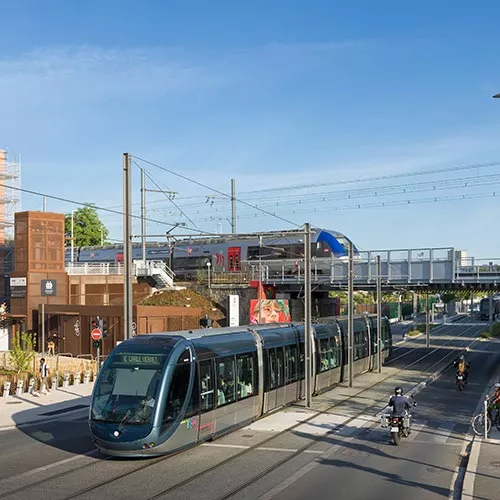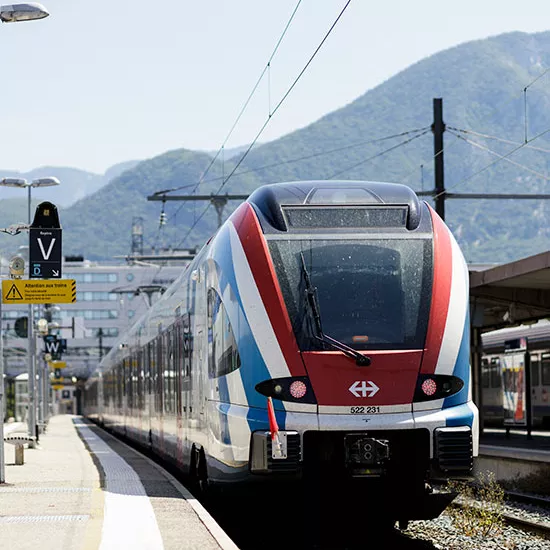Metropolitan Regional Express Services (SERM)
We are supporting the development of these low-carbon multimodal service projects. Built around a railway infrastructure, they promise to improve mobility between cities and their suburbs.
Rural mobility stations: to promote shared options in rural areas
Multimodal public transport services
A tool for the ecological transition...
The aim of these intermodal services is to develop low-carbon everyday mobility, at a time when the transport sector accounts for 31% of greenhouse gas emissions in France. Half of these emissions (51%)1 are due to people travelling by private car, particularly in the suburbs. Aimed at residents of major metropolitan areas and their suburbs, SERMs offer an alternative to car use and are based around one main mode of transport: the train.
...And to break down territorial and social barriers
By better connecting activity hubs close to the urban area with each other, but also with suburban and rural areas, and by helping to develop and revitalise neglected areas, SERMs also work to break down territorial and social barriers.
SERMs in fact play a structuring role in rebalancing the region. By providing a more attractive transport offer, they improve the accessibility of the various areas of the city and thus reduce imbalances between centre and suburbs or between suburbs. They offer sustainable mobility solutions as an alternative to the private car for everyday journeys.

26 projects
of SERMs have been approvedby the State in July 2025
€800M
has been invested by the State in the 2023-2027 CPER2

62,8%
of short-distance journeys are made by car3
A railway backbone
At the heart of these new services, the development of regional trains plays a central role and aims to offer:
- extended timetables
- guaranteed all-day service with clear, regular timetables
- increased frequency at peak times
- an attractive level of service at weekends
- frequent stops in the busiest areas
To make it easier to get to and from the train, SERMs aim for coordinated timetables between the different modes, as well as multimodal ticketing and information.
We are convinced that the railways must be the backbone of SERMs, because it is the railways that, with very low energy consumption per passenger and virtually zero greenhouse gas emissions, make it possible to transport a very large number of passengers and offer this new service to as many users as possible.
CEO of SNCF Réseau
Project by project
24 approved SERM projects
The law on SERM4 of 27 December 2023 accelerates and structures their deployment. To date, the government has approved 24 SERM projects. Our companies SNCF Réseau and SNCF Gares & Connexions, the infrastructure managers, are supporting the Regions and Cities in the gradual implementation of these projects in conjunction with the other stakeholders involved (transport operators, Société des Grands Projets, etc.). Some SERMs are in the early development stage, while others are more advanced and are already operating the first phases, as in Bordeaux, Strasbourg and along the Léman Express.
Greater Lyon
The Greater Lyon metropolitan regional express service (SERM) is a major public initiative supported by the French State, the Auvergne-Rhône-Alpes region, Greater Lyon and SYTRAL Mobilités. Its primary objective is to simplify daily commutes and promote sustainable mobility choices. By increasing train frequency and integrating multiple transport modes—including metro, light rail, river shuttles, cycling and road infrastructure—SERM aims to offer a seamless travel experience.
Lyon’s railway hub, a vital junction for European, national and regional traffic, is under significant pressure and has reached saturation point. To address this, SERM has two key objectives:
- Short term: improve regional rail service frequency, with trains running every half-hour throughout the day, and even more frequently during peak hours at two stations.
- Medium to long term: gradually expand services across the metropolitan area, increasing frequency to every 15 minutes to 30 minutes by 2040 and extending service hours. These enhancements will be supported by phased upgrades to both the main and branch lines of Lyon’s railway network.
The project comprises 103 stations, and includes the creation of 3 new stops—Portes du Dauphiné, Reventin-Vaugris, and La Grand-Croix, which is part of the SERM project in the neighbouring city of Saint Etienne. Existing stations will also be upgraded to meet new intermodal requirements and accommodate the rise in passenger traffic.
This mobility initiative will also improve passenger services, including simplified fare structures, real-time travel updates, and multimodal integration to deliver a seamless, attractive, low-carbon mobility offering for the entire region.
The Provence Côte d'Azur line (LNPCA)
The new Provence Côte d'Azur line (LNPCA) aims to increase the number of daily trains by 66% and to roll out three metropolitan regional express services to the Aix-Marseille, Toulon and Nice areas and the Côte d'Azur so that 62% of road traffic is transferred to rail by 2035, i.e. 23 million new passengers. As a result the network and some existing stations will be revamped, and new rail facilities and stations will be created.

Bordeaux Metropole
Supported by Bordeaux Métropole, the Gironde department, the Nouvelle-Aquitaine region and the French State, the SERM aims to make daily travel easier in the Bordeaux metropolitan area and beyond, by offering attractive alternatives to the private car in terms of both cost and journey times. Between now and 2030, €175 million worth of development work is planned.
The project comprises 3 lines, 300 km of track and 54 stations and rest areas. It is scheduled to come on stream progressively until 2030. It aims to:
- Improve train services, in particular by increasing frequency and timetables;
- create direct inter-city links;
- create new express coach lines to connect towns outside the metropolitan area that are not served by rail;
- open 2 new stations, at Bouscat Sainte-Germaine (due to open in June 2023) and Talence Médoquine;
- introduce a combined Bordeaux Métropole and TER ticket.
SERMS in short
Based on trains, SERMs aim to develop low-carbon everyday mobility by offering an alternative to car use, particularly in suburban areas. Designed for large cities and their suburbs, they offer sustainable mobility solutions and promote the ecological transition of transport. Moreover, by reducing imbalance between urban centers, suburbs, and rural areas, they also contribute to territorial and social integration.
To date, the government has approved 26 SERMs : Orléans, Rouen, Opal Coast, Hauts-de-France, Lorraine-Luxembourg, Strasbourg, Mulhouse-Basel, Dijon, Besançon, Franco-Genevois, Chambéry, Grenoble, Lyon, Saint-Etienne, Clermont-Ferrand, Tours, Brittany, Nantes, Bordeaux, Basque Country, Toulouse, Montpellier, Marseille, Toulon, Azur, Avignon.
Hauts-de-France
The Hauts-de-France SERM project aims to make it easier for 5 million people to get around by providing a concrete response to the problems of road congestion in Flanders, Calais, Valenciennes, Douais, Cambrésis and Arrageois. The project includes a doubling of rail services, with up to 8 trains per hour and extended services from 5am to 11pm. The creation of the Hauts-de-France express network, 40 km of new line between Lille and Hénin-Beaumont, and the creation of a new central station in Lille are also part of the SERM project.
Grand Est region
Three projects are currently underway to provide a coherent range of mobility services in this area at the crossroads of Luxembourg, Germany and Switzerland:
The Strasbourg SERM aims to extend the range of intercity express trains and coaches on the main routes through the conurbation, as far west as the river Bruche and the Vosges foothills, and east towards Germany. It also aims to strengthen the European Metropolitan Express Network (REME), due to come into service in December 2022.
The Mulhouse SERM and its link with Basel aim to develop services in a context of increased rail traffic linked to the arrival of the "RER Basel". This will involve the creation of 6 km of track and a new stop at the EuroAirport, known as the Nouvelle Liaison Ferroviaire EuroAirport. The project is at the pre-configuration stage.
The Lorraine - Luxembourg SERM, through its work on intermodal transport, public transport and modal shift from road to rail, aims to deal with the increase in mobility along a corridor including Nancy, Metz, Thionville and Luxembourg.
Rouen
Approved by the Ministry of Transport on 27 June 2024, the Rouen SERM project is included in the 2023-2027 Mobility Protocol of the State-Region Plan Contract, signed on 12 July 2024. The project covers an area of more than 2,400 km² where 800,000 people live, work and travel. More than 300,000 jobs are concentrated in 270 municipalities. In order to encourage modal shift and meet residents' expectations in terms of everyday mobility, the Rouen SERM project will involve strengthening the rail service and implementing complementary means of travel, such as express coaches, carpooling or cycling.
The SERM project is eagerly awaited by the residents of the Rouen catchment area, and will contribute to the ecological transition. It will have to help organise the habitability and development of an area that is at once urban, peri-urban and rural, with several hubs.

The Léman Express
This first Franco-Swiss cross-border RER, in service since December 2019, comprises 6 lines spread over 230 km of track. Its aim is to encourage a modal shift from road to rail between Greater Geneva and the north of Haute-Savoie, a catchment area with a population of almost one million. The project, under SNCF project management, represents an investment of 234.2 million euros. It is supported and funded by 13 partners.